2018 Heritage BC Conference
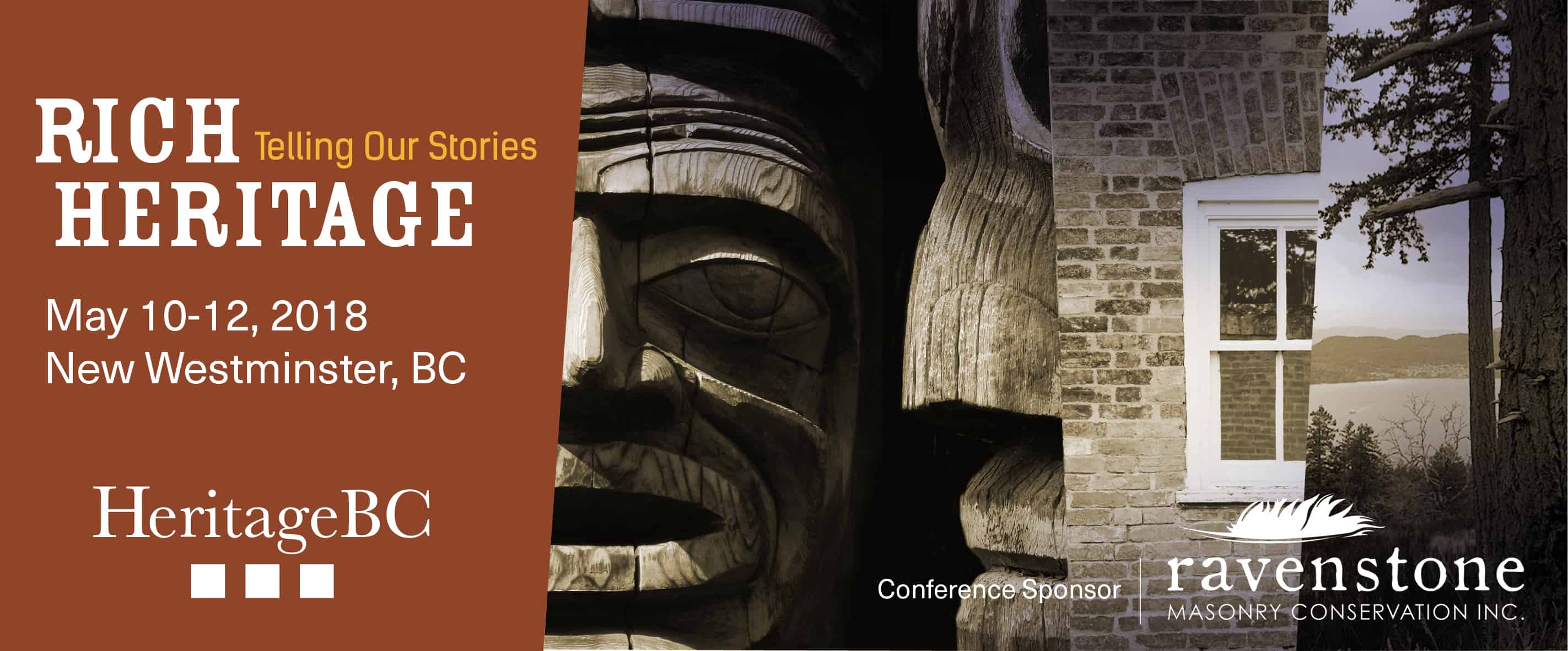
THANK YOU
We had a terrific conference. It was hard work, but we managed to have some fun, as well. Here the delegates participate in the wave.
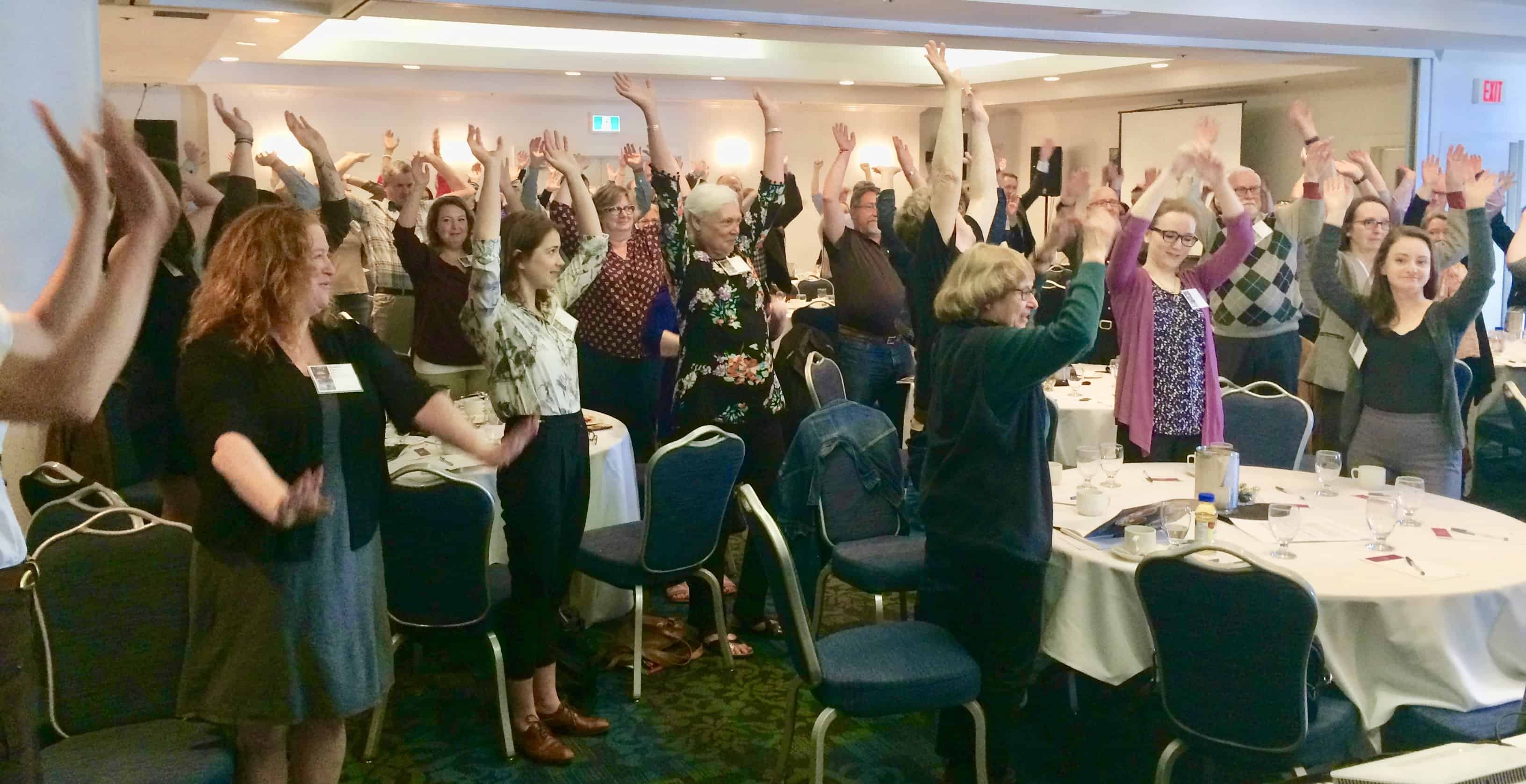
Following the inspiring and eloquent keynote address by Dr. Lorna Williams at the 2017 conference, we asked conference participants to explore their vision for the future of heritage. Hundreds of words were written, but none more repeatedly than “stories”.
Stories connect people, inspiring them to look again and to see different perspectives. Storytelling brings to life beliefs, ideas, knowledge and values.
- Stories connect past and present: they describe people and places, connecting generations and cultures with the future.
- Stories create community: they form relationships, encouraging action and engagement.
- Stories preserve language: they celebrate cultures, creating common understanding.
- Stories share knowledge: they describe natural history, cultures, environment, buildings and land, creating a space for oral histories.
- Stories connect people: they highlight the histories of Indigenous peoples and inspire youth in the future of our heritage.
Stories are intangible but they transmit heritage and culture. They share memories and reveal new understandings. Stories draw us together and shape our communities.
Full registration is $330 for the first registrant of an organization. A 25% discount applies for all subsequent registrations for the same organization. A coupon code will be emailed to you following the first registration.
If you want to register for one day, complete the registration form including a single registration.
- If you want to attend on Friday, May 11, use the coupon code ONEDAYFRI
- If you want to attend on Saturday, May 12, use the coupon code ONEDAYSAT
Reading a Building: Layer by Layer
Thursday, May 10 (9:00 to 3:45)
Reading a Building: Layer by Layer
Planning the conservation of an old building, including interventions and adaptive reuse, always starts with understanding its history and the alterations that have happened to it over the decades.
This session will illustrate how thorough historical research of records and archival photographs and compiling a chronology, combined with an investigative exploration of the building itself – inside and out – can inform good, best-practice decision-making for historic buildings. This planning method is applicable to both residential and non-residential heritage properties.
We start with an illustrated presentation of the discovery of the 1865 Irving House, as we explore the home's documented history and the actual interventions identified in the building itself to provide the basis for an incredible journey of restoration and adaptation. Other examples of rehabilitation and restoration projects will also be presented. The session includes a tour of the historic Irving House, including behind the scenes areas not open to the public.
This is conceived as a day-long workshop to explore the building, and its paints, wallpapers, hardware, carpets, lighting and mechanical systems.
Full-day registration is encouraged, however, it may be possible to attend select sessions.
- When registering for the conference, please indicate your preference to attend this full-day session.
- If you wish to attend a select session, please email Nathan. We will then provide you with options.
Space is limited and full registrants will be given preference. Explorations will occur inside and outside; please dress appropriately for the weather. A morning snack and bagged lunch is included with full-day registration. All attendees must register for this workshop. Details will be emailed to registrations a few days before the workshop.
John Makepeace, Jade West Engineering Ltd.
Eric Pattison, founder, Pattison Architecture
Stuart Stark, heritage consultant for the preservation of built heritage (Stuart Stark and Associates)
Simone Vogel-Horridge, paint and paper restoration expert
Location: Irving House, 302 Royal Ave, New Westminster
Co-sponsored by


AIBC 5.75 Core
Workshops for Heritage Commissions/Committees and Heritage Not-For-Profit Organizations
Thursday, May 10 (12:45pm)
Community Partnerships: Forging relationships, stimulating engagement for Heritage Commissions/Committees
Working with municipal staff, politicians, and community partners, Heritage Commissions and Advisory Committees create opportunities to tell stories. These groups perform the on-the-ground local work of sharing the community story. The conference is a venue for sharing and discussing the work of growing healthy communities through storytelling.
Moderator: Laura Saretsky, Heritage Program Manager, Heritage BC
Panellists:
Brenda Smith, Chair, Maple Ridge Community Heritage Commission
David Ridley, Executive Director, Edmonton Heritage Council
AIBC 1.25 Non-Core
Thursday, May 10 (2:15pm)
Planning and Incentives for Local Governments for Heritage Commissions/Committees
Municipalities have many tools at their disposal to protect heritage assets, involve the community, and encourage conservation. Some, like the community heritage commission, come through the Local Government Act. Others tools are left to the planning and imagination of the local government. This session explores preparing heritage strategies and developing incentive programs.
Moderator: Laura Saretsky, Heritage Program Manager, Heritage BC
Panellists:
Councillor Heather King, City of Delta
John Rae, Manager, Cultural Planning & Development, Resort Municipality of Whistler
Britney Quail, Heritage Policy Planner, City of New Westminster
AIBC 1.25 Core
Thursday, May 10 (1:00pm)
Building the Capacity of your Organization
Stage-based approach to business planning for your not-for-profit
Do you feel like your organization is struggling, and has become increasingly dependent on the contributions of a select group of core volunteers or leaders? Is there a challenge or an issue holding your organization back? This session is your opportunity to step back from your day-to-day operations and gain clarity on where to best build your organization’s “bench strength”. Understanding your organization’s lifecycle stage can allow you to pinpoint your exact growing pains and next steps in capacity development. In this workshop, you will learn how to undergo an in-depth Organizational Assessment based on 5 core capacity builders in not-for-profit organizations: Programs, Governance, Management, Financial Resources, Administrative systems and infrastructure.
Understanding the current state of your organization in each of these areas will then inform the development of a Capacity Improvement Plan for your organization: an action plan of immediate steps to improve the effectiveness of your organization over a defined timeframe.
Presented by Maria Turnbull, Associate Executive Director, Vantage Point
AIBC 1.25 Non-Core
Signature Heritage Tours
Thursday, May 10 (4:00pm)
Queens Park Conservation Area Tour
Tour Leaders: Britney Quail and Jim Wolf
Explore the newest and largest heritage conservation area in Western Canada with New Westminster's Heritage Policy Planner, Britney Quail.
No additional cost; registration is required.
AIBC 1.25 Core
Thursday, May 10 (4:00pm)
Coast Salish Cultural Heritage
Tour Leader: Christie Lee Charles
Hear historical connections to Ke-kait and surrounding villages in the shared territory of the coast Salish people's. Christie Charles of Musqueam will be bringing you along the way of her ancestors and how they used the lands and waters in the area we now know as New Westminster. Hear of plant medicines, archeological connections, fishing life, natural resources and how they were used in sacred and everyday uses. Christie will also discuss the reasons and meaning behind land protection, respect and preservation.
Thursday, May 10 (4:00pm)
The HRA Tour
Tour Leader: Elana Zysblat
Spend an hour touring five Heritage Revitalization Agreement projects in downtown New Westminster - including endangered house relocation, infill, and rehabilitation; the conversion of 1880s cottages into supportive housing and the sensitive incorporation of residential towers within historic institutional properties and their operations. The projects showcased include completed projects, approved projects, as well as an under construction project. Join heritage consultant, Elana Zysblat on a walking tour through Albert Crescent and a portion of the downtown neighbourhoods to learn about a diversity of building forms, ages, and styles and how the HRA tool has successfully been implemented here to manage the evolution of a mixed-use and vibrant area of the city.
No additional cost; registration is required.
AIBC 1.25 Core
Sponsored by

Thursday, May 10 (4:00pm)
Irving House: A Social History
Tour Leader: Lorraine Irving
Today, Irving House stands as one of the oldest community heritage sites in BC. Before it became a museum, it was a home filled with family, friends and community.
No additional cost; registration is required.
AIBC 1.25 Non-Core
Heritage SLAM!
Thursday, May 10 (7:00pm)
Heritage SLAM!
Inspired by Pecha Kucha and Ignite events, Heritage SLAM! was the surprise hit at our 2017 conference. Heritage SLAM! gives delegates the opportunity to showcase their best, most innovative and exciting projects in a fast-paced, fun evening. Each presenter shows off their work with 15 slides and 15 seconds per slide. SLAM!
Registration to present and attend is required.
Sponsored by
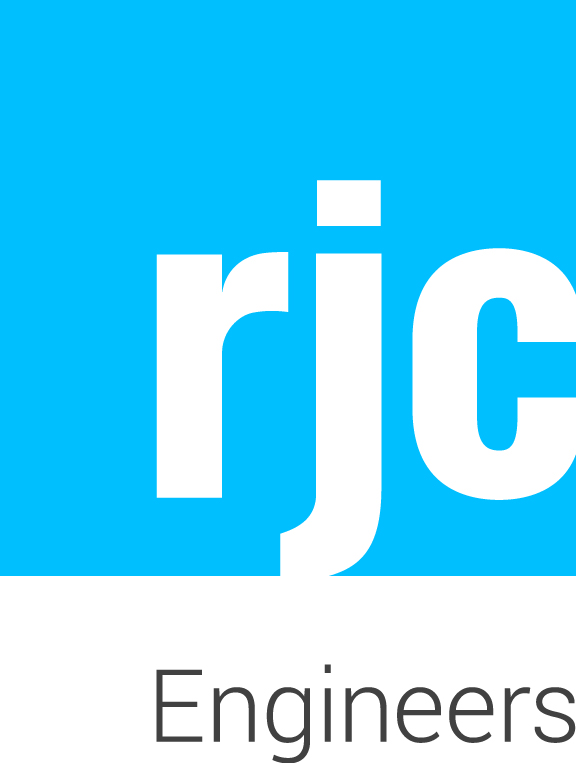
AIBC 1.25 Non-Core
Opening and Closing Plenary Workshops
Friday, May 11 (9:00am)
(Re)Interpretation: Challenging the Narrative of Cultural Heritage
The story of heritage has long been told from a single point of view. But, is that the correct point of view? How does the narrative change when different voices tell the same stories?
The morning starts with the different worldviews from a diverse panel of experts, who tell and re-tell their stories. We then explore how the different worldviews of heritage can broaden our own interpretations to tell a richer, more inclusive story.
Panellists:
Chief Rhonda Larrabee, Qayqayt Nation
Lorene Oikawa, President, Greater Vancouver Japanese Canadian Citizens' Association
Satwinder Bains, PhD (Candidate), Director, South Asian Studies Institute, University of the Fraser Valley
Dr. Imogene Lim, Vancouver Island University Department of Anthropology, and Global Studies Program
Maurice Guidbord, Président, Société historique francophone de la Colombie-Britannique
Sponsored by
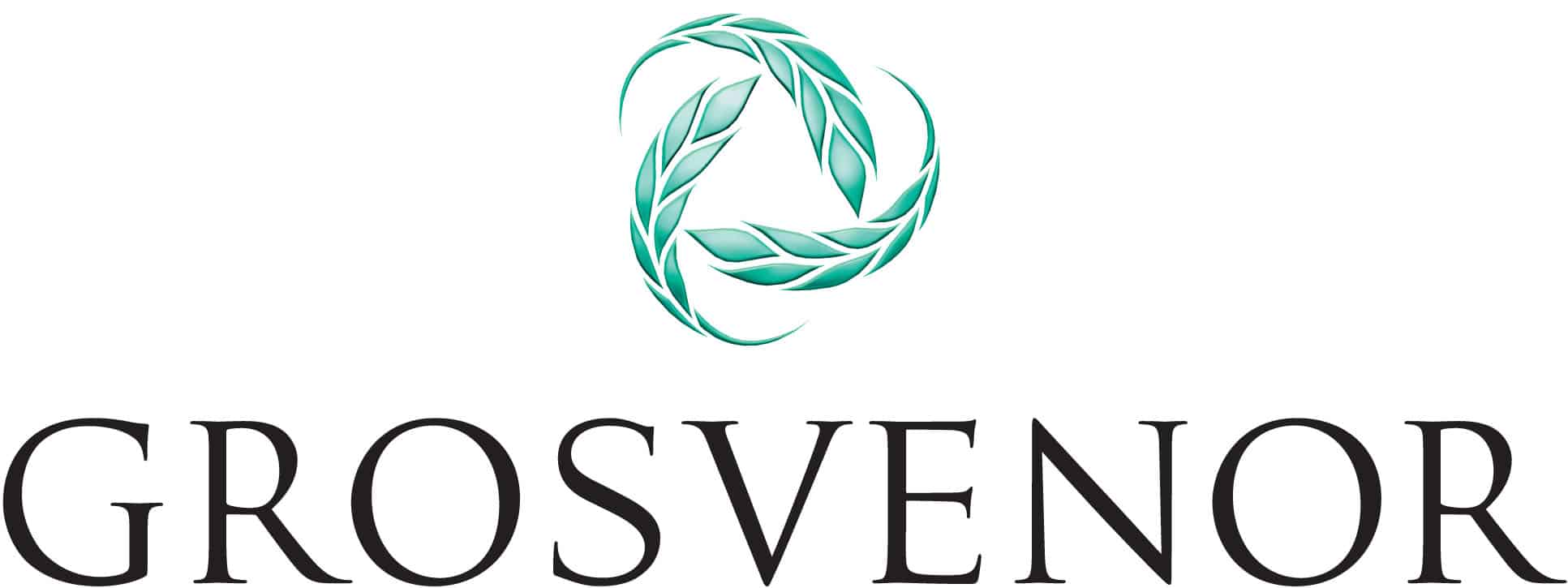
AIBC 1.25 Non-Core
Saturday, May 12 (2:00pm)
Writing a New Story: The Future of the Sector
Rich Stories: Turning the Page; writing a new chapter
In this plenary-workshop, we dive deep into the state of the sector as we examine strategies that continue to guide our work and explore the rising themes that are shaping future directions. In a far-ranging investigation, we will consider heritage as a contributor to community identity, economic diversity, reconciliation, environmental stewardship, social value and other compelling influences and impacts.
A range of colleagues will start off this in-depth conversation, and then we turn it over to you to for your insight and inspiration.
But, it doesn’t end there: this plenary-workshop is the beginning of an extensive, province-wide series of roundtables that will bring communities together to share ideas, conditions, challenges, successes, influences, and aspirations.
Bringing together personal, local, and regional perspectives, this important initiative will inform province-wide strategic development and influence program development and delivery, as well as provide a model of community consultation and engagement and a catalyst for collaborations and communications.
Moderator:
Richard Linzey, Director, Integrated Resource Operations, Heritage Branch, Forests, Lands, Natural Resource Operations and Rural Development
Panellists:
Angie Bain, Lower Nicola Indian Band
Jennifer O'Connor, Athena Sustainable Materials Institute
Lynda Lafleur, Manager, Community Relationships North, Columbia Basin Trust
David Ridley, Executive Director, Edmonton Heritage Council
Sponsored by

AIBC 1.25 Non-Core
Workshops
Friday, May 11 (1:00pm)
The Story of a Riverfront: Adaptation, Revitalization and Place-making - a guided walk
The Fraser riverfront is arguably one of the most important historic sites in New Westminster. It’s evolution and transformation, in conjunction with the needs of the community at any given time, is a never-ending story in New Westminster. With both spiritual and industrial roots, it has always been a place of gathering that, over many decades, has been the site of continuous urban planning and revitalization projects.
This unique session explores the waterfront’s evolution, as it responds and adapts to changing priorities and vision while remaining a relevant and vital place that matters.
This session is an outdoor walking tour of the waterfront adjacent to the Inn at the Quay and River Market. Please dress for the weather. In the event of severe weather, the session will move indoors.
Panellists:
Jim Wolf, historian and Heritage Planner, City of Burnaby
Leslie Shieh, River Market
Councillor Jaimie McEvoy, City of New Westminster
Sponsored by
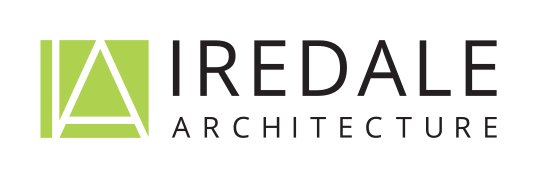
AIBC 1.25 Non-Core
Friday, May 11 (2:00pm)
Indigenous Cultural Landscapes: understanding Indigenous heritage/cultural ties to the land
In Canada, the colonial history of treating Indigenous lands as terra nullius continues to erase/ignore Indigenous people's continuity on their lands since time immemorial. Heritage narratives within cultural landscape recognition and preservation so often emphasize physical 'evidence' such as buildings, built forms, burial grounds and battle sites. How can we move past 'evidence-based' heritage to a much deeper, often intangible way of expressing history in the land, relationships with the land? How can we start to understand all of these lands as Indigenous cultural landscapes? And what are the implications of that? This workshop explores narratives of cultural landscapes as stories, laws, ancestors, songs, memories, events, food sources, commerce and more. We also look at ways that partnerships can help with the recognition and protection of Indigenous cultural landscapes in working towards inclusive decision-making and storytelling.
Moderator: Kamala Todd, Indigenous community planner and filmmaker
Panellists:
Tumia Knot, Councillor, Kwantlen Nation; President, Seyem Qwantlen Business Group
Michelle Rhodes, Associate Professor, Geography and the Environment, University of the Fraser Valley
Terry Hood, Projects Coordinator, Stave West Forest & Recreation Area
Karen Rose Thomas, Tsleil-Waututh archaeologist
Mary Suchell, Nlaka'pamux archaeologist
Friday, May 11 (2:00pm)
Sharing Stories of the “Other”
How do you bring multiple stories from different communities together to challenge traditional historical narratives in a way that invites all viewers to learn? The co-creators of 150 Years and Counting: Fighting for Justice on the Coast share their challenges and the questions they encountered in putting this exhibit together. Through a workshop case study activity, we consider key points and questions, providing tools and tips for sharing stories of the “Other.”
Panellists:
Dr. Imogene Lim, Vancouver Island University Anthropology Professor
Kathryn Gagnon, Curator-Manager, Cowichan Valley Museum & Archives
Dr. Tusa Shea, Program Coordinator, Arts & Sciences Programs, Division of Continuing Studies, University of Victoria
AIBC 1.25 Non-Core
Friday, May 11 (2:00pm)
Small Scale, Big Impact
Communities are shaped by their unique cultural landscapes. Small-scale, place-based businesses and organizations are essential to this culture, and to the evolution and adaptation of these communities. In this workshop, the small program explores how unique place-based cultural assets in our communities can build social, cultural and economic strength. Through exploring cases of revitalization across Canada, we answer the questions: How do we tell the stories of our communities? What is the role of local cultural economies in these stories? How do we support these cultural economies?
As a not-for-profit community developer, the small program celebrates and activates existing heritage assets to attract and sustain vibrant cultural entrepreneurial hubs. We believe that cultural assets, tangible and intangible, define communities: historical buildings and landscapes, skills related to natural resource extraction (like fishing), folk architecture (like barns), and traditional crafts (like weaving). Local champions who drive these efforts are shaping the evolution of placemaking, supporting the growth of both local identity and industry.
Panellists
Amy Calder, ERA Architects
Heather Campbell, Culture of Small
AIBC 1.25 Core
Friday, May 11 (3:30pm)
Memory of Place
Memory of place can be a powerful tool to influence the decision-makers, but the heritage sector is only beginning to explore how community memories impact values of place. Our panel explores the ways emotions, compassion, ethics, and imagination, through our stories of history and heritage, can contribute to planning and influence policy.
Moderator: Berdine Jonker, Resource Manager, Ministry of Forests, Lands, and Natural Resource Operations and Rural Development
Panellists:
Bill Yuen, Heritage Vancouver
Elana Zysblat, Ance Building Services Co. Inc., heritage consultant
Angie Bain, researcher with the Union of BC Indian Chiefs
AIBC 1.25 Non- Core
Friday, May 11 (3:30pm)
Song/Spoken Word/Oral History: singing our histories speaking our truths
Three local Indigenous performers share their own ways of speaking their truths, through the oral tradition, which has been the main source of historical record keeping on these lands since time out of mind. Come and hear the unique stylings of Ron Dean Harris aka Ostwelve (Sto:lo), Theresa Warbus (Sto:lo) and Christie Lee Charles aka Miss Christie Lee (Musqueam)--three inspiring cultural leaders with deep roots in these lands, along this great river, Sto:lo.
Panellists:
Ronnie Dean Harris aka Ostwelve
Christie Lee Charles a.k.a “Miss Christie Lee"
Theresa Warbus
Friday, May 11 (3:30pm)
New World Interpretation
As technology influences almost every aspect of our lives, we feel its presence in the heritage sector more and more. Blogs, videos, augmented reality and Facebook are now entrenched in our tools to communicate and connect. But, are we seeing results for our efforts? And, what about heritage - how is technology impacting the way we interpret our heritage and the message we communicate?
Moderator: Laura Saretsky, Heritage Program Manager, Heritage BC
Panellist:
Michael Schwartz, The Jewish Museum and Archives
Lorene Oikawa, President, Greater Vancouver Japanese Canadian Citizens' Association
Christina Reid, Collections Manager, Tretheway House Heritage Site
AIBC 1.25 Non-Core
Saturday, May 12 (9:00am)
Places that Matter
In seven years, 125 Vancouver sites have been identified to celebrate people, places and events that have shaped that city. To date, 86 descriptive plaques have been installed and the project now boasts a rich online component to share diverse and lesser-known stories. Also impressive are the plaques bearing French, Chinese, and Punjabi, adding deeper layers of meaning and recognition. Looking forward, five new plaques will be added to the inventory, and bearing the Musqueam language to recognize sites of particular significance to that Nation. This workshop explores the successes and lessons learned in identifying and celebrating not only well-known and visible heritage sites, but also the hidden histories of a community.
Moderator: Judith Mosley
Panelists:
Jessica Quan
Naveen Girn
Maurice Guibord
AIBC 1.25 Non-Core
Saturday, May 12 (9:00am)
c̓əsnaʔəm, the city before the city
Dominant narratives portray Vancouver as a young, new city. But these lands have been occupied for thousands of years. Located in the area now commonly known as Marpole in Vancouver, c̓əsnaʔəm was first occupied about 5000 years ago and was once one of Musqueam's largest villages. Generations of families lived at what was then the mouth of the Fraser River, harvesting the rich resources of the delta. Rhiannon Bennett from Musqueam will discuss the c̓əsnaʔəm village and Musqueam's continuous connection to their territory. This presentation will highlight language, oral history, Musqueam's rich culture--past and present. Indigenous ways of knowing, colonialism and Musqueam's actions to protect c̓əsnaʔəm will be discussed, conveying the deep history of this area now known as Metro Vancouver.
Presented by Rhiannon Bennett
Saturday, May 12 (9:00am)
Storytelling and Your Community
Celebrate community and enliven your heritage project with storytelling and living history in a freewheeling and fun presentation. Storyteller and museum educator, Gabriel Newman, will share his experiences and approaches to celebrating community stories, and will provide tips and tools for you to collect, cultivate and share stories.
Presented by Gabriel Newman, Education Coordinator, Vernon Museum
AIBC 1.25 Non-Core
Saturday, May 12 (10:30am)
Impacts and Legacies
BC | Canada 150 has been one of the most impactful grants programs for BC’s heritage and museums sectors - not only for the infusion of funds, but more so for the impacts and legacies it has enabled. The program has helped many communities build momentum to describe their histories and heritage in new and innovative ways. The BC Museums Association, together with the support of Heritage BC, was honoured to be a part of administering this grant program on behalf of the Province of British Columbia. A panel of grant recipients will describe the innovative and collaborative ways we can share our collective provincial heritage and the positive outcomes of such projects.
Moderator: Erica Mattson, Executive Director, BC Museums Association
Pitt Meadows Heritage and Museums Society (Pitt Meadows Historical Mapping Project)
District of Lillooet (Japanese Canadian Internment Commemorative Garden Project)
Hli Goothl Wilp-Adokshl Nisga’a/Nisga’a Museum (The Ancestors Collection and Nisga’a Treaty Exhibition Infrastructure / Technological Enhancement Project)
MediaNet (Contemporary and Traditional Practices: Multi-media Longhouses)
Fernie & District Historical Society (Fernie Museum Gallery and Infrastructure Upgrade)
Britannia Mine Museum (Development of Community and Sustainability Exhibit Decks)
AIBC 1.25 Non-Core
Saturday, May 12 (10:30am)
c̓əsnaʔəm, the city before the city
Dominant narratives portray Vancouver as a young, new city. But these lands have been occupied for thousands of years. Located in the area now commonly known as Marpole in Vancouver, c̓əsnaʔəm was first occupied about 5000 years ago and was once one of Musqueam's largest villages. Generations of families lived at what was then the mouth of the Fraser River, harvesting the rich resources of the delta. Christie Charles from Musqueam will discuss the c̓əsnaʔəm village and Musqueam's continuous connection to their territory. This presentation will highlight language, oral history, Musqueam's rich culture--past and present. Indigenous ways of knowing, colonialism and Musqueam's actions to protect c̓əsnaʔəm will be discussed, conveying the deep history of this area now known as Metro Vancouver.
Presented by Christie Charles
Saturday, May 12 (10:30am)
Cultural Landscapes
As the tangible and intangible interactions of humans and nature, cultural landscapes call up complex ideas of 'ownership' and stewardship over a land-base that can be contested and re-envisioned over time. Through three case studies, our panellists explore ideas of land conservation, recreation access and commemoration, while preserving and presenting heritage values.
Moderator: Jenifer Iredale
Panellists:
Sarah Waters, Executive Director, Tumbler Ridge UNESCO Global GeoPark
Denise Cook, Denise Cook Design
Elana Zysblat, Ance Building Services Co. Inc., heritage consultant
Brian Smallshaw, Saltspring Island, Historian, Southern Gulf Islands Japanese Charcoal Pit Kilns Project
Steve Nemtin, Galiano Island, Technical expert, Southern Gulf Islands Japanese Charcoal Pit Kilns Project
AIBC 1.25 Core
Saturday, May 12 (12:30pm)
Three Peer Roundtables
As we move toward the end of the conference, we provide an opportunity for you to enjoy the company of your peers, and a chance to discuss new ideas and to share experiences. There is no set agenda, so bring your discussion topics. Attendance is open to all meetings.
Not-for-Profit Organizations Roundtable
Moderator: Jennifer Dunkerson
Heritage Commission/Committees and Local Government Roundtable
Moderator: Laura Saretsky
Heritage Consultants and Professionals Roundtable
Moderator: Lisa Seip
Sponsored by
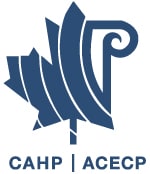
AIBC 1.25 Non-Core
Meals
Friday, May 11 (7:00pm)
Dinner and Awards
Sponsored by
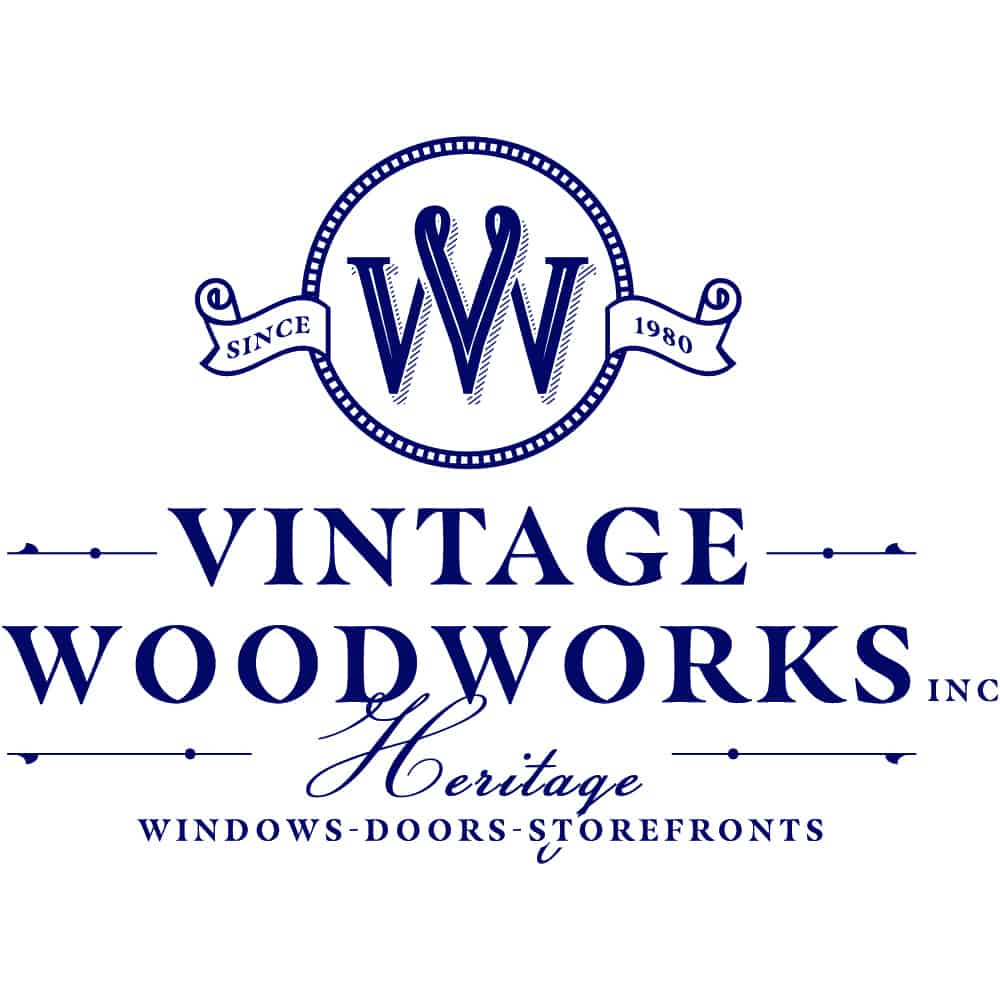
Thursday, May 10
A bag lunch will be available to full registrants for the Reading a Building: Layer by Layer at Irving House.
Drinks and light fare will be available at Heritage SLAM!; registration fee applies.
Friday, May 11
Complimentary hot breakfast
Saturday, May 12
Complimentary hot breakfast
Complimentary lunch
Programming, people and schedule are subject to change without notice.
Annual General Meeting
May 11 at 5:15pm
The 2018 Annual General Meeting will take place at the annual conference in New Westminster, May 11 at 5:00pm
The agenda will include:
- Reports
- Financial Statement
- Appointment of Auditor
- Elections of Directors
- Special Resolution: Replacement of Bylaws
RESOLVED as a special resolution that the current Bylaws of the Society be deleted in their entirety and that the form of Bylaws attached hereto as Schedule A be adopted as the Bylaws of the Society in substitution for, and to the exclusion of, the existing Bylaws of the Society, with effect upon the electronic filing of a Transition Application with the BC Registrar of Companies.
Please visit this page for more information.
